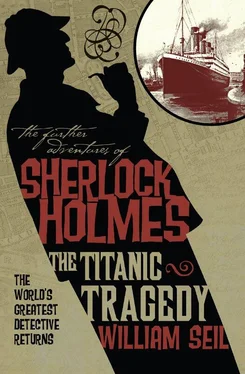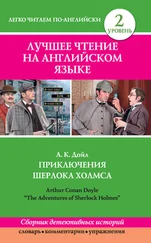The Titanic was now nearly vertical in the water. For a long time it just stood there, its stern pointing towards the sky. Then it began its gradual descent, down towards its dark and peaceful new home. As it made its way down, there was a loud bubbling sound as air escaped from the hull.
When the first of the ship’s tall funnels hit the water line, it snapped off like a twig, sending a cloud of soot and steam into the air. It appeared to glide through the water for a moment before it sank. One by one, the other funnels followed suit.
Suddenly, there was a mighty shattering sound below the surface of the water. Some cried that the Titanic was breaking up, but I could not tell for sure. An enormous bubble of air rose from the water as the stern remained poised for one final moment, and then disappeared.
‘She has gone,’ said Miss Norton. She could barely find the breath to speak. All those people... Mr Holmes... Oh, my God!’
Miss Storm-Fleming’s head rested on her arms. I could hear her sobbing. I lifted my elbow over the edge of the boat and placed my free hand on her shoulder.
I held back my tears: they would come later, at the proper time.
I looked over at Ismay. He was bowed down over his oar. I could only imagine what he must be thinking.
Minutes passed as we quietly contemplated what had happened. The only sounds were a frothing noise from the sea and a chorus of weeping in the lifeboat.
But the cause of our grief had not yet ended. The worst of it was about to begin.
Back where the mighty ship had just sunk, we heard the cries of hundreds of souls. They had survived the sinking and were out there in their life jackets, floating in the still water amongst the ship’s debris.
There were both cries for help and screams of pain. The temperature of the water was below freezing. They would not last long.
My two companions were staring out into the darkness. Soon, Miss Storm-Fleming turned to me. She had the look of someone who desperately wanted to jump over the side to help, but knew that would be futile.
‘Doctor Watson, is there nothing we can do?’
I put my right hand over the side and into the water. At first, it merely felt cold. I left it there. It did not take long before I felt a stinging sensation. I lifted my hand out of the water and warmed it under my arm.
‘You there!’ I motioned to the crewman in charge of the boat. ‘We must row back and help. We can fit a few more in here.’
My statement sparked a wave of debate up and down the boat. The man pondered the request.
‘Very dangerous, sir. True, we might save a few. On the other hand, we might find ourselves surrounded. In the state those folks are right now, they’d all try to climb on board at once. If that happened, this little canvas boat would sink like a rock.’
Private debate continued throughout the boat.
‘Perhaps we should wait a while...’ one woman shouted, ‘...until things have quietened down a little.’
Miss Storm-Fleming jumped to her feet, but I put my hand on her shoulder and held her down.
‘By then they will be nearly dead!’ she cried. ‘Is that what you mean?’
Our boat never did go back for survivors. I would later find out that there was very little effort by any of the lifeboats to pull people from the water.
The one notable exception was Fifth Officer Lowe in Lifeboat No. 14. He divided his fifty-five passengers among four other boats and took on board a few of the experienced crew. They mounted a valiant rescue effort, but to little avail. Most of those in the water had already succumbed to the cold temperatures.
After a while, the cries in the distance ended. We were left to silent contemplation and prayer. This was interrupted, from time to time, by talk of being rescued. That light off in the distance never did come to our aid. But we were confident, hopeful even, that help would soon be on its way.
As time passed I found myself growing drowsy and disorientated. Chills ran through my body. Despite my lightheadedness, I recognized the early signs of hypothermia. The cold sea air and the ordeal of the past several days were taking their toll. At some point, I fell fast asleep.
I awoke as light began to fill the sky. My head was resting in Miss Norton’s lap, and I was covered with a blanket. There was considerable conversation taking place among the passengers. Some thought they saw the outline of a ship in the distance.
Miss Storm-Fleming, who had been looking across the sea with the others, turned to me and felt my forehead.
‘What time is it?’ I asked.
‘Four o’clock.’
‘Is there a ship?’
‘We still do not know. There is something out there in the distance.’
I rose to a sitting position and looked out across the sea. For a moment, in the pinkish light of dawn, it appeared that we were surrounded by sailing boats. But, as my eyes cleared, I could see that these images were just a continuing reminder of our ordeal. The white objects were icebergs. Most were small, but they were scattered all over the sea. Not far from the side of our boat I saw a deckchair floating.
‘You must rest now, Doctor Watson. For a while we thought we were going to lose you,’ said Miss Storm-Fleming.
I closed my eyes, feeling old and useless. I then slept for two more hours.
‘Doctor Watson, wake up, it is time to go. The rescue ship is here.’ Miss Norton was lifting up my head.
We were pulling up alongside a small liner, the Carpathia . Below the single funnel of the Cunard ship, I could see passengers lining the rail. Some, judging by the blankets draped over their shoulders, were survivors of the Titanic , looking for relatives in approaching lifeboats.
I attempted to climb the ladder that had been cast down from the deck, but found I was still too weak. A member of the crew threw me a rope, which was looped at the end. I put this under my arms and began to climb, as he pulled me from above.
We were offered blankets and coffee by one of the Carpathia ’s passengers, which we accepted, gratefully. The mood on board was, as one might expect, very sombre. Some passengers were sitting in chairs, staring blankly at the deck. Others were walking about, searching for loved ones.
We saw Officer Lowe, who was strolling about trying to console survivors of the disaster. After speaking to a woman in a deckchair, he walked over to where we were standing.
‘Doctor, I am very pleased to see you here. Can I help you with anything?’
‘No, no, thank you,’ I replied. ‘I was just wondering if you, perhaps, had seen Commodore Winter?’
‘No, I am afraid to say I have not.’
‘Mr Futrelle?’
‘No, nor him either and, if I’m not mistaken, most of the boats have pulled up alongside... Forgive me, Doctor, but you do not look well. Why do you not go below? The Carpathia ’s passengers have given up their cabins for the survivors. They are all being very kind and helpful.’
‘We will soon, Mr Lowe. Thank you.’
I was feeling unsteady on my feet and somewhat dizzy. With the assistance of my two companions, I contacted a member of the Carpathia ’s crew, who took me below to a cabin. Again, I slept.
When I awoke, hours later, Miss Storm-Fleming was sitting by my bedside and we were alone in the small, modest cabin.
‘Doctor Watson, you will be pleased to know that the ship’s doctor said you should recover fully. All you need is rest.’
‘Holmes?’
She gripped my hand. ‘Still no sign. And there is no sign either of Futrelle, the captain — or that scoundrel, Moriarty.’
She had been talking to the other passengers and crew and told me what she had learned. The captain had apparently gone down with the ship. There was a report that he had been on the bridge when it went down, while someone else said they had seen him swimming in the water. One rumour had it that he had swum to a lifeboat carrying a baby and then left without attempting to save himself. The young wireless operator, Mr Bride, had survived, but his colleague, Mr Phillips, had not. They had both heroically stayed at their posts until the very end, when the captain relieved them of their duties.
Читать дальше












